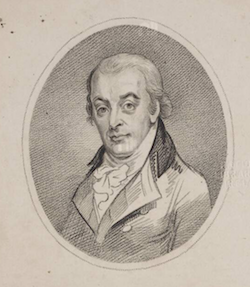
Arthur Browne
Browne was one of the most distinguished academic lawyers to teach in Trinity College, Dublin, perhaps the ablest. His writings are still worth reading; and not merely for their historic interest. His life reveals a lawyer of wide culture and compassion, who tried in the turmoil and cruelty of eighteenth century Ireland to reconcile opposition to popular violence and an attachment to the established state and church with opposition to arbitrary state power. His views on legal education and on many aspects of the law were enlightened for the time. Browne deserves a place in the history of Irish law, and not merely as the last Irish Prime Serjeant.
[Paul O’Higgins “Arthur Browne (1756-1805):
An Irish Civilian” (1969) 20 NILQ 255, 270].The Irish jurist Arthur Browne was one the most gifted legal scholars of eighteenth-century Ireland; he was also an educator, an advocate, and a parliamentarian. Born in America of Irish parentage, Browne studied at Trinity College, Dublin, eventually becoming professor of civil law and publishing works on civil, admiralty, and ecclesiastical law at the turn of the nineteenth century. A Hiberno-civilian, he acted as advocate and judge in both the common and civil law courts and was the last prime serjeant of Ireland. The polyglot Browne wrote political tracts, translations, and literary and antiquarian essays. He was also an MP (1783-1800), a passionate protestant, and an Irish whig.
[Seán Patrick Donlan “‘The Debt Is Forgotten’:
A Compendious View of Arthur Browne, c1756-1805”
(2009) 13(3) Electronic Journal of Comparative Law;see also JC Sweeney “The Admiralty law of Arthur
Browne” (1995) 26 Journal of Maritime Law and
Commerce 59; and Seán Patrick Donlan “‘Regular
Obedience to the Laws’. Arthur Browne’s Prelude to
Union” in Seán Patrick Donlan and Michael Brown
(eds) The Laws and Other Legalities of Ireland,
1689-1850 (Routledge, 2011 | Amazon) 255.]
A full biography is due later this year. Meanwhile, the School of Law, Trinity College Dublin has inaugurated an annual series of public lectures in his honour and memory. Last Friday, Prof Oran Doyle, Head of the School of Law, introduced the inaugural Arthur Browne lecture by Professor Gráinne de Búrca, who posed the question
Is EU Anti-Discrimination Law in Decline?
Her ultimate answer is that it is not really in poor health, but she did point to some symptoms of abatement which had prompted the question in the first place, and she ultimately argued that EU anti-discrimination law is not so much in decline as in a new and more complex phase of its development. At a time when Europe is in crisis on multiple fronts, the protection of the marginal is all the more important. A commitment to equality and non-discrimination is a mark of a humane society, especially at times of stress.

Gabrielle Defrenne

Prof Gráinne de Búrca
This Directive does not cover difference of treatment based on nationality and is without prejudice to provisions and conditions relating to the entry into and residence of third-country nationals and stateless persons on the territory of Member States, and to any treatment which arises from the legal status of the third-country nationals and stateless persons concerned.
The significant differences between the Directives have generated arguments that the variations in scope of protection give rise to a hierarchy of equality grounds. It was to meet such arguments that, in 2009, the EU Commission proposed a Directive on implementing the principle of equal treatment between persons irrespective of religion or belief, disability, age or sexual orientation. It was approved by Parliament, but it is stuck in the Council of Ministers. Article 19(1) TFEU requires unanimity on the part of the Council, and Germany in particular has objected to the proposed Directive, on grounds of costs to business. It is now difficult to see how it might be adopted any time soon.
There have been remarkably few references to the CJEU under the Race Directive, some have been inadmissible, and in only 4 has the CJEU reached the substance of the issue, most recently Case C-83/14 Nikolova, a case in which the applicant was supported by the Open Society Institute. There has been rather more CJEU litigation under the Framework Directive: 27 cases relate to age discrimination, 7 to disability, and 5 to sexual orientation; 2 relating to religion are pending. Overall, these are very small numbers for Directives that were adopted 16 years ago, and have been in force for 13, in an EU now of 28 Member States.
Prof de Búrca therefore considered the question whether these modest numbers are an indication of the decline of EU anti-discrimination law. Drilling down into the cases, she also considered the question whether the modesty of the Court’s analysis numbers is a further indication of the decline of EU anti-discrimination law. For example, she perceived mixed signals in the cases concerning disability. On the one hand, in Case C-303/06 Coleman v Attridge [2008] ECR I-05603, the Court interpreted the Framework Directive to prohibit discrimination on the grounds of disability by association. On the other hand, in Joined cases C-335/11 and C-337/11 Ring and HK Danmark, the Court distinguished between illness and disability, and held in that the Directive reaches illness only when it results from disability; and in Kaltoft (Case C-354/13 FOA v Kommunernes Landsforening) the Court took a similar approach to the relationship between obesity and disability. Both Coleman and Kaltoft indicate caution on the part of the CJEU in its approach to the Framework Directive, and this is borne out by Case C-363/12 Z v A Government Department, referred from Ireland, in which the CJEU held that the denial of maternity leave to a mother who had a baby by surrogacy did not amount to discrimination contrary to the Directive. As with Case C-356/12 Glatzel v Freistaat Bayern, Prof de Búrca considered this posture to be excessively deferential to the interests of the Member State.
She perceived slightly stronger signals in favour of equality in the cases concerning sexual orientation. Even at the height of its expansionist tendencies relating to equality and non-discrimination, the CJEU in Case C-249/96 Grant v South West Trains [1998] ECR I-621 held that the refusal by an employer to allow travel concessions to the person of the same sex with whom a worker has a stable relationship, where such concessions are allowed to a worker’s spouse or to the person of the opposite sex with whom a worker has a stable relationship outside marriage, does not constitute discrimination prohibited by the Treaty. However, after the adoption of Article 19 TFEU, the CJEU has held in four cases that, once a Member State has decied to treat opposite sex marriages in a similar way to same sex registered partnerships or other legal relationship for some purposes, that State has to do so for EU purposes as well. There have been, in these cases, some cautiously progressive developments by the Court, leveraging developments at national law. In the most symbolic of the cases, the Court drew the inference, from homophobic remarks made by the leading shareholder in a Romanian football club, that the club had a policy against hiring homosexual players, which infringed Article 19 TFEU and the Framework Directive (see Case C-81/12 Asociatia Accept, noted here).
In Prof de Búrca’s view, the cases concerning race have been equally cautious. In Case C-54/07 Firma Feryn [2008] ECR I-5187, the Court held the fact that an employer states publicly that it will not recruit employees of a certain ethnic or racial origin, because its customers might not like them in their homes, constitutes direct discrimination contrary to the Race Directive. And in Nikolova (above), the Court held that where all the electricity meters in an urban district mainly lived in by Roma were placed on pylons at a height of between six and seven metres (rather than two metres in other districts) infringed the Race Directive, and any person in the affected district could maintain a challenge under the Directive against that collective measure.
There have been few references to the CJEU under the 2000 Directives; but, whilst the number of cases to the Court is beyond its control, but how it teats them is – and it’s treating them in a very gingerly fashion, avoidng some of the issues of discrimination, esp race discrimination, and generally being cautious in what it says. Even more striking was the absence of religious discrimination cases before two headscarf cases were referred last year, especially as the European Court of Human Rights has heard many cases on the issue. Prof de Búrca said that it will be very interesting to see what the CJEU does in the two references, given that the ECHR has been very deferential to Member States. Given the decision of the CJEU against EU accession to the European Convention on Human Rights, she speculates that the CJEU may seek to develop a strong autonomous EU human rights jurisprudence, and that it may therefore go further in finding discrimination and protecting equality in such religious headscarf cases.
Age discrimination cases constitute the largest batch of cases before the CJEU concerning the two 2000 Directives. In general, the Court has afforded a degree of latitude to the Member States, but it has applied the principle of proportionality quite rigorously. For example, in Case C-286/12 Commission v Hungary, the Court held that a national scheme requiring compulsory retirement of judges, prosecutors and notaries when they reach the age of 62 gave rise to a difference in treatment which did not comply with the principle of proportionality, and that Hungary had therefore failed to fulfil its obligations under Articles 2 and 6(1) of the Framework Directive. However, there has been no case law on affirmative action in these Directives.
Prof de Búrca again observed that the law number of cases overall is striking, and she wondered why there are so few in general, and why the majority of cases have been in the field of age discrimination. She posited that this may in part be because age affects everyone, and discrimination on that ground is more visible than on many other prohibited grounds, where it’s overt. Moreover, in many contexts of discrimination, those affected are often less resourced, so it is important that equality bodies, and non-governmental organisations can support litigation (as OSI did in Nikolova (above)). For all of these reasons, a study of what’s going on at domestic level is necessary. She reported her preliminary view of a survey of several jurisdictions, which found similar patterns in higher courts: more litigation relating age discrimination, less relating to race, religion, disability and sexual orientation. The only exception is the UK, where there are large numbers of cases across all of the prohibited grounds. Having implemented the full EU equality acquis, most Member States have active patterns of litigation, but this is very often before specialist tribunals, from which, for reasons of costs, domestic appeals or CJEU references, are constrained. Cases do reach upper courts, but in low numbers; the numbers are uneven across grounds; and, even here, there seems to be some reluctance to refer issues to the CJEU. In the UK, in particular, many cases, even in the higher courts, tend to be decided on the basis only of the national implementing law, and not on the basis of the underlying or transposed EU principles.
Against this backdrop, Prof de Búrca concluded that it would be too much to claim that EU anti-discrimination law is in decline, but she did conclude that the CJEU is increasingly taking a cautious approach, and she speculated that there may be four reasons for this:
1. perhaps because these are times of cricis, including especially a crisis of legitimacy for the EU when all of its institutions are coming under increasing scrutiny, the Court may feel the need to take a prudent approach;
2. the political opposition to the Directive proposed in 2009 may have induced caution against overreach on the part of the Court;
3. the new grounds are more politically, socially and religiously, contested than gender was; and
4. the 2000 Directives are hedged with exclusions, and the Court may be reflecting that ambivalence.
All in all, she concluded that the Court has not retreated; it is finding a path in a new context. More generally, EU anti-discrimination law isn’t in decline, it has entered a new and more complex phase. Taking a long view, the 13 years the two 2000 Directives have been in force are still early days; and, as the volume of cases increases, both domestically and in the CJEU, we may enter upon an era of the same strong protection of transnational EU equality principles as developed heretofore in gender cases. The presentation concluded with a lively question and answer session, with questions in particular from John Temple Lang, Anthony Kerr, Marguerite Bolger SC, and Cliona Kimber.
 It is entirely appropriate that (as I complete this post on International Day Against Homophobia, Transphobia and Biphobia, founded inter alia to draw attention to the discrimination experienced by LGBTI people worldwide) Prof de Búrca’s lecture concluded, not with the decline of EU anti-discrimination law, but with hope for its future. Given that Arthur Browne was a keen defender of the rule of law, and a strong proponent of the virtues of civil law (that is: Roman law, the EU law of its day), there could be no more fitting inaugural lecture in his honour and memory.
It is entirely appropriate that (as I complete this post on International Day Against Homophobia, Transphobia and Biphobia, founded inter alia to draw attention to the discrimination experienced by LGBTI people worldwide) Prof de Búrca’s lecture concluded, not with the decline of EU anti-discrimination law, but with hope for its future. Given that Arthur Browne was a keen defender of the rule of law, and a strong proponent of the virtues of civil law (that is: Roman law, the EU law of its day), there could be no more fitting inaugural lecture in his honour and memory.